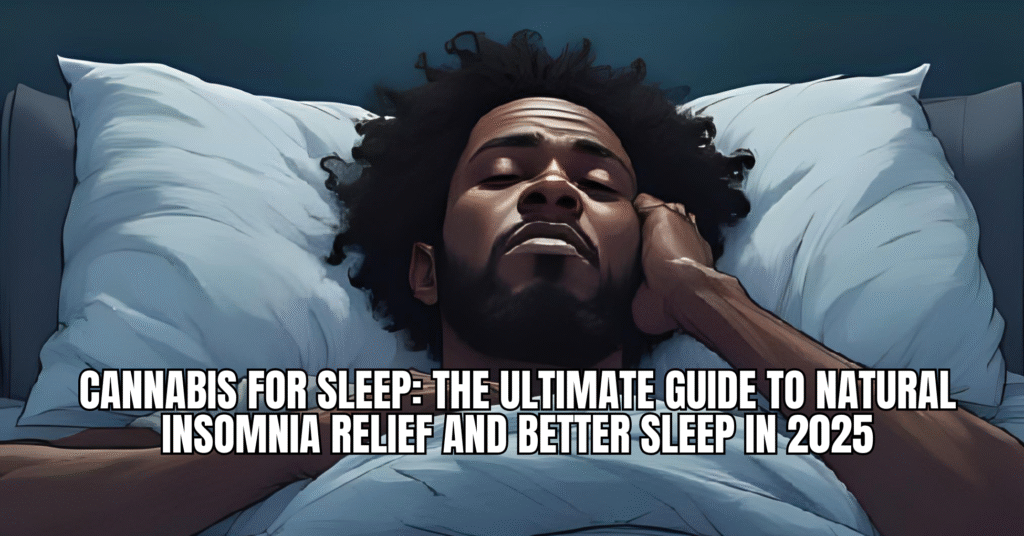Sleep disorders affect over 70 million Americans, with insomnia being the most prevalent sleep disturbance. As prescription sleep medications come with dependency risks and side effects, cannabis for sleep has emerged as a natural alternative. This comprehensive guide explores how medical marijuana and CBD can transform your sleep quality and help you achieve restorative rest naturally.
Table of Contents
- Understanding Cannabis and Sleep Enhancement
- How Cannabis Affects Your Sleep Cycle
- Best Cannabis Strains for Sleep Disorders
- CBD vs THC for Sleep Improvement
- Cannabis for Specific Sleep Disorders
- Optimal Dosing for Sleep Enhancement
- Consumption Methods for Better Sleep
- Safety and Side Effects
- Frequently Asked Questions
Understanding Cannabis and Sleep Enhancement
Cannabis sleep aid effectiveness stems from its interaction with your body’s endocannabinoid system, which regulates circadian rhythms, sleep-wake cycles, and overall sleep quality. Medical marijuana for insomnia works by addressing multiple factors that contribute to sleep disturbances, including anxiety, pain, and racing thoughts.
Research indicates that cannabis can help people fall asleep faster, stay asleep longer, and experience more restorative sleep. The sedating effects of certain cannabis compounds make it particularly valuable for those struggling with chronic insomnia and sleep maintenance issues.
How Cannabis Affects Your Sleep Cycle
Cannabis influences sleep through several mechanisms:
Adenosine Enhancement: Cannabis may increase adenosine levels, a neurotransmitter that promotes sleepiness and regulates sleep pressure throughout the day.
GABA System Activation: Cannabis can enhance GABA neurotransmitter function, promoting relaxation and reducing brain activity that interferes with sleep onset.
Cortisol Regulation: CBD helps normalize cortisol levels, reducing stress hormones that can keep you awake at night.
Sleep Architecture: Cannabis may alter sleep stages, potentially increasing deep sleep while reducing REM sleep in some users.
Circadian Rhythm Support: The endocannabinoid system helps regulate your internal body clock, and cannabis can help reset disrupted sleep-wake cycles.
Best Cannabis Strains for Sleep Disorders
Indica Strains for Sleep
Indica varieties are renowned for their sedating effects and sleep-promoting properties:
High-THC Indica Strains:
- Granddaddy Purple: Deep relaxation and sleep induction
- Northern Lights: Classic sleep strain with potent sedating effects
- Purple Kush: Heavy body effects ideal for insomnia
- Afghan Kush: Traditional strain for deep, restorative sleep
High-CBD Indica Strains:
- ACDC: Relaxing without heavy psychoactive effects
- Harlequin: Balanced CBD/THC for sleep without grogginess
- Cannatonic: Gentle sedation with minimal intoxication
- Critical Mass: High CBD content with mild THC effects
Hybrid Strains for Sleep
Some hybrid strains offer excellent sleep benefits:
- Girl Scout Cookies: Evening relaxation with mood enhancement
- Blue Dream: Gentle sedation suitable for sleep beginners
- OG Kush: Balanced effects that promote restful sleep
CBD vs THC for Sleep Improvement
Understanding cannabinoid effects helps optimize your cannabis sleep strategy:
THC for Sleep:
- Faster sleep onset (sleep latency reduction)
- Increased deep sleep stages
- Reduced sleep interruptions
- May cause morning grogginess
- Higher doses more effective for sleep
- Psychoactive effects
CBD for Sleep Disorders:
- Reduces anxiety that interferes with sleep
- Non-psychoactive sleep support
- Minimal morning after-effects
- Addresses pain-related sleep issues
- May improve sleep quality without sedation
- Legal in most jurisdictions
CBN for Insomnia: CBN (cannabinol) is gaining recognition as a powerful sleep cannabinoid, often called “nature’s sleeping pill.” It provides sedating effects without significant psychoactivity.
Cannabis for Specific Sleep Disorders
Chronic Insomnia Treatment
Cannabis for chronic insomnia focuses on addressing both sleep onset and sleep maintenance issues. High-THC indica strains taken 1-2 hours before bedtime can help establish consistent sleep patterns.
Sleep Apnea Support
While cannabis isn’t a cure for sleep apnea, it may help improve sleep quality by reducing anxiety and promoting deeper sleep phases. CBD may also help reduce inflammation in airways.
Restless Leg Syndrome Relief
Cannabis muscle relaxation properties can help reduce the uncomfortable sensations and involuntary movements associated with restless leg syndrome, allowing for more peaceful sleep.
PTSD-Related Sleep Disturbances
Medical marijuana for PTSD can address nightmares, night sweats, and hypervigilance that interfere with sleep. THC may help reduce REM sleep, potentially decreasing nightmare frequency.
Shift Work Sleep Disorder
Cannabis can help reset circadian rhythms for shift workers by promoting sleep during unconventional hours and helping maintain sleep quality despite schedule disruptions.
Optimal Dosing for Sleep Enhancement
Effective cannabis dosing for sleep requires careful titration:
CBD Sleep Dosing:
- Mild sleep issues: 10-25mg before bedtime
- Moderate insomnia: 25-50mg
- Severe sleep disorders: 50-100mg
- Take 1-2 hours before desired sleep time
THC Sleep Dosing:
- Beginners: 2.5-5mg
- Experienced users: 5-15mg
- Severe insomnia: 15-30mg
- Take 1-3 hours before bedtime
Combination Dosing: Many find success with balanced THC:CBD ratios (1:1 to 1:3) for comprehensive sleep support without excessive psychoactive effects.
Microdosing for Sleep: Some people achieve better sleep with very low doses (1-2.5mg THC) that don’t produce significant intoxication but still promote relaxation.
Consumption Methods for Better Sleep
Edibles for Sleep
- Longest-lasting effects (6-8 hours)
- Sustained sleep throughout the night
- No lung irritation
- Onset: 30-90 minutes
- Best for sleep maintenance issues
Tinctures and Oils
- Precise dosing control
- Faster onset than edibles (15-45 minutes)
- Can be taken sublingually or mixed with beverages
- Easy to adjust doses
- Good for sleep onset issues
Vaping for Sleep
- Fastest onset (2-10 minutes)
- Shorter duration (2-4 hours)
- Useful for middle-of-night wake-ups
- Easier to control immediate effects
- May not sustain sleep all night
Topical Sleep Products
- Localized pain relief for sleep
- No psychoactive effects
- Can complement other consumption methods
- Good for muscle tension that interferes with sleep
Safety and Side Effects
Cannabis for sleep is generally well-tolerated, but consider these factors:
Common Side Effects:
- Morning grogginess (hangover effect)
- Dry mouth and eyes
- Increased appetite
- Vivid dreams or dream suppression
- Tolerance development with regular use
Sleep-Specific Considerations:
- May reduce REM sleep with high THC use
- Tolerance can develop, requiring dose increases
- Rebound insomnia possible with sudden discontinuation
- May interact with other sleep medications
Best Practices:
- Use consistently for 2-3 weeks to assess effectiveness
- Avoid daytime use if it affects nighttime sleep
- Consider tolerance breaks every few weeks
- Maintain good sleep hygiene alongside cannabis use
Frequently Asked Questions
Q: How long before bed should I take cannabis for sleep? A: Take edibles 1-3 hours before bedtime, tinctures 30-60 minutes before, and vaping 15-30 minutes before desired sleep time. Timing depends on onset speed and your individual response.
Q: Will I be groggy in the morning after using cannabis for sleep? A: Some people experience morning grogginess, especially with higher THC doses. Starting with lower doses and choosing strains with balanced cannabinoid profiles can minimize this effect.
Q: Can I use cannabis for sleep every night? A: Many people use cannabis nightly for sleep, but tolerance can develop. Consider taking periodic breaks or rotating different products to maintain effectiveness.
Q: What’s the difference between indica and sativa for sleep? A: Indica strains are generally more sedating and better for sleep, while sativa strains tend to be energizing. However, cannabinoid and terpene profiles matter more than strain classification.
Q: Is CBD or THC better for insomnia? A: THC is typically more effective for falling asleep quickly, while CBD is better for addressing anxiety-related sleep issues. Many find combinations most effective for overall sleep improvement.
Q: Can cannabis help with sleep disorders like sleep apnea? A: While cannabis may improve sleep quality, it’s not a treatment for sleep apnea. Always consult healthcare providers for serious sleep disorders and use cannabis as complementary support.
Q: How does cannabis compare to prescription sleep medications? A: Cannabis may offer similar sleep benefits with potentially fewer side effects and less dependency risk. However, individual responses vary, and some conditions may require prescription treatments.
Q: What terpenes are best for sleep? A: Myrcene, linalool, and terpinolene are associated with sedating effects. Look for strains high in these terpenes for enhanced sleep benefits.
Cannabis for sleep offers a promising natural alternative to traditional sleep medications. With proper strain selection, dosing, and timing, medical marijuana can significantly improve sleep quality and help establish healthy sleep patterns for lasting relief from insomnia and other sleep disorders.
Safe and legal cannabis consumption in Chiang Mai requires understanding local laws, choosing quality products, and following responsible use practices. At Space Trees Cannabis Dispensary, we’re here to guide you through every step of your cannabis journey in Northern Thailand.
Disclaimer: This information is for educational purposes only and should not be considered medical or legal advice. Cannabis laws and regulations may change. Always consult with healthcare providers and legal professionals for personalized guidance. Space Trees Cannabis Dispensary encourages responsible use and compliance with all local laws and regulations.



